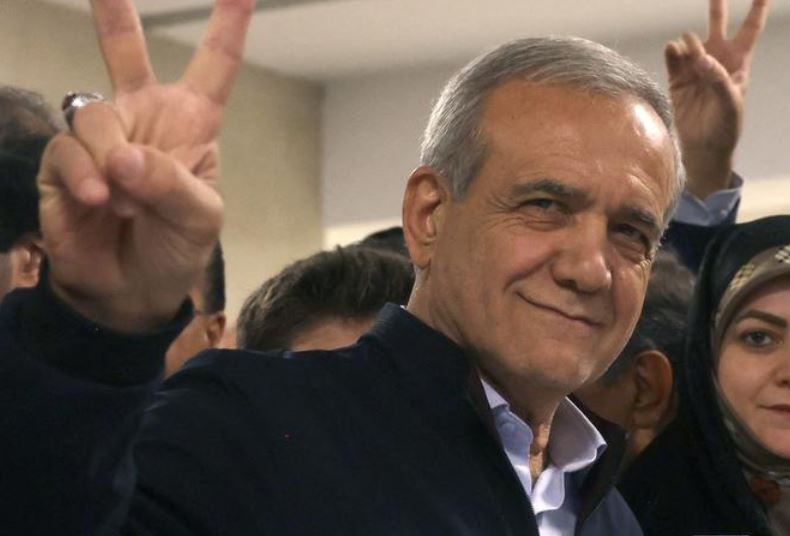In a significant development, Indian Prime Minister Narendra Modi extended his heartfelt congratulations to Masoud Pezeshkian, Iran’s newly elected President. Pezeshkian, a reformist candidate, secured a decisive victory in the runoff election against his ultraconservative rival, Saeed Jalili. This election marks a pivotal moment in Iran’s political landscape and has potential implications for its international relations, particularly with India.
A New Era in Iran
Masoud Pezeshkian’s ascension to the presidency marks a substantial shift in Iran’s political dynamics. Pezeshkian, 69, garnered around 54% of the vote, defeating Saeed Jalili, who secured approximately 44%. The election was precipitated by the untimely death of President Ebrahim Raisi in a helicopter crash, prompting an early poll initially scheduled for 2025.
Modi’s Congratulatory Message
Prime Minister Modi’s congratulatory message to Pezeshkian was shared via social media platform X. “Looking forward to working closely with you to further strengthen our warm and long-standing bilateral relationship for the benefit of our peoples and the region,” Modi wrote. This message underscores the importance of India-Iran relations and signals a potential deepening of bilateral cooperation.
Historical Ties and Future Prospects
India and Iran have maintained a robust relationship despite Tehran’s strained ties with Western countries, including the United States. The two nations have historically collaborated on various fronts, and Modi’s message indicates a commitment to continuing this partnership. One notable area of cooperation is the Chabahar port project, which aims to enhance connectivity and trade routes between the two countries.
Chabahar Port Project
In May, India and Iran signed a contract to develop and equip the long-stalled Chabahar port project. This project is strategically significant for India as it provides a direct trade route to Afghanistan and Central Asia, bypassing Pakistan. However, the project has faced challenges, particularly from Washington, which has warned Indian firms working on the project of potential sanctions.
Pezeshkian’s Political Journey
Masoud Pezeshkian, previously a relatively obscure figure, emerged as a prominent reformist voice in the Iranian political arena. His victory is seen as a mandate for change and reform within the Islamic Republic. Pezeshkian’s campaign focused on economic revitalization, social reforms, and improving international relations. His election as the ninth president of Iran is expected to bring a fresh perspective to the country’s governance.
International Reactions
Pezeshkian’s victory has garnered attention from around the world. Many view his election as a potential turning point for Iran, especially concerning its strained relations with the West. Countries in the region and beyond are closely monitoring how Pezeshkian’s administration will navigate these complex international waters.
Challenges Ahead
Despite the optimism surrounding Pezeshkian’s victory, his administration faces significant challenges. The economic situation in Iran remains precarious, exacerbated by international sanctions and internal mismanagement. Additionally, Pezeshkian will need to address human rights issues and navigate the delicate balance between reformist aspirations and conservative elements within the country.
Modi’s Strategic Message
Prime Minister Modi’s congratulatory message is not merely a diplomatic formality but a strategic move. By extending an olive branch to Iran’s new leadership, India is positioning itself as a key partner in Iran’s future endeavors. This move also signals to the international community India’s intent to maintain and strengthen its ties with Iran, irrespective of external pressures.
Bilateral Cooperation
The cooperation between India and Iran spans various sectors, including energy, infrastructure, and regional security. The development of the Chabahar port is a testament to this multifaceted partnership. This port not only facilitates trade but also enhances regional connectivity, benefiting both nations economically and strategically.
Economic Implications
Pezeshkian’s presidency could potentially open new avenues for economic collaboration between India and Iran. With his reformist agenda, there is hope for greater economic liberalization and opportunities for foreign investments in Iran. This, in turn, could bolster India’s economic interests in the region.
Regional Stability
The geopolitical landscape of the Middle East is complex and volatile. Iran plays a crucial role in this region, and its political stability has far-reaching implications. Pezeshkian’s leadership is expected to bring a degree of stability and predictability, which could positively impact regional dynamics. India, with its strategic interests in the region, stands to benefit from a stable and reformist Iran.
Conclusion
The election of Masoud Pezeshkian as Iran’s President and Prime Minister Modi’s subsequent congratulatory message signify a new chapter in India-Iran relations. This development is not only a testament to the enduring ties between the two nations but also a hopeful indicator of future cooperation. As Pezeshkian embarks on his presidency, the world watches with anticipation, hoping for positive changes within Iran and its international relations.
SEO Optimization
Summary Table
| Key Learning Points | Description |
|---|---|
| Starmer’s First Major Act | Scrapping the Rwanda deportation plan as a significant policy shift. |
| Origins of the Rwanda Scheme | Introduced by former PM Rishi Sunak to deter Channel crossings. |
| Labour’s Victory | Labour’s landslide victory ends 14 years of Conservative rule. |
| Criticism from Conservatives | Hardliners argue the scheme could have worked if implemented properly. |
| Financial and Humanitarian Costs | High expenses with no tangible results and human rights concerns. |
| New Direction for Immigration Policy | Focus on effective, humane solutions for managing migration. |
| Broader Political Implications | Reflects a shift towards balanced governance and social justice. |
| Public and International Reactions | Generally positive, with praise from human rights advocates. |
| Transition to New Policies | Emphasis on border security, processing times, and international cooperation. |
Soumya Smruti Sahoo is a seasoned journalist with extensive experience in both international and Indian news writing. With a sharp analytical mind and a dedication to uncovering the truth, Soumya has built a reputation for delivering in-depth, well-researched articles that provide readers with a clear understanding of complex global and domestic issues. Her work reflects a deep commitment to journalistic integrity, making her a trusted source for accurate and insightful news coverage.



